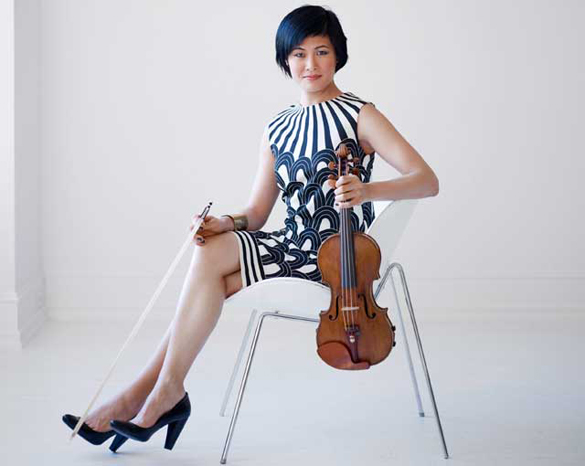The Berkshire Eagle
By Andrew L. Pincus
July 13, 2017
original link
At Tanglewood, a concerto for our times
 (Jurgen Frank photo)
(Jurgen Frank photo)LENOX — Violinist Jennifer Koh remembers, as a child of 6 in the mid-1980s, being frightened by the beating death of a Chinese-American man near Detroit by a group of car factory workers.
It was a "huge awakening" for her and her family, she says, but also for the Asian-American community as a whole. It showed that Asians could be killed, "just based on the color of their skin."
Koh, the American-born daughter of Korean refugees, was growing up in Glen Ellyn, Ill., when the beating took place. She says the assailants mistook their victim, Vincent Chin, for Japanese and, in a time of Japanese economic power, accused him of stealing their jobs.
Vincent Chin is at the center of a new violin concerto by Vijay Iyer that Koh will bring to Tanglewood Thursday night on a program by The Knights, the Brooklyn-based chamber orchestra. The 25-minute work, titled "Trouble," is a co-commission by the Ojai Music Festival in California, where it had its premiere on June 8; Cal Performances at Berkeley, and the Boston Symphony Orchestra. (A BSO premiere has not been scheduled.)
"Trouble" is a product of the Trump era. In a telephone interview, Koh recalled that it grew out of discussions that she and Iyer, a Chinese-American and kind of musical polymath, had been having about the current political "rhetoric" and its implications for immigrants of the last two generations.
When she asked Iyer to write a concerto for her, she suggested that a movement be dedicated to Chin. So the third of the six movements is titled "For Vincent Chin."
The Knights is nothing if not eclectic. "Trouble" joins Purcell's "Fantasia upon One Note," John Adams' "Common Tones in Simple Time" and Mozart's Symphony No. 40 on the Ozawa Hall program.
"Trouble" is part of a "Mixtape" project in which Koh, now 40, commissions works to explore the form of the violin concerto and how it can interact with culture and current events. But, she said, the Iyer work is an artistic rather than political statement despite the political implications. And though she regularly performs the standard repertoire as well as new works, she says she doesn't draw hard and fast distinctions between high and low culture, classical and popular.
"I don't quite believe in the idea of separation between the arts, or between genres," she said. "I do sincerely believe that you either have great music or you have bad music. You have great artists or your have bad artists."
In that, she is in sympathy with Iyer, who said in a recent New York Times interview, "The term `classical music' is not that meaningful to me. What it really means is `the music of Europe' or something, and that's not what's happening here [in America]."
Koh, who said she contacts her composers via websites and social media, recalls that she made a cold call to Iyer after advocating for him when she served on a grants panel in 2012. To be proper about it, she waited a year and a day to make the call.
"Trouble" doesn't reflect anger, she says. Instead it's "really a complete journey" going from birth to "a sense of death or loss." It's also, she says, part of a next step in the evolution of the concerto form from the baroque concerto grosso to the "heroic" romantic concerto pitting the soloist against the orchestra.
"I think what Iyer does is to use the violin sometimes as a point of introducing material, but sometimes being overtaken as well," she says. The violin sometimes leads, "but it's not always specifically a more traditional heroic role."
Or as Iyer, a tenured Harvard professor and a MacArthur fellow, put it when he curated the Ojai festival in June: the curator's role for him was "going to have to pose an inherent critique to any of these categories - because that's what American music has always been."
Copyright © The Berkshire Eagle
© Jennifer Koh, All Rights Reserved. Photography by Juergen Frank. Site by ycArt design studio